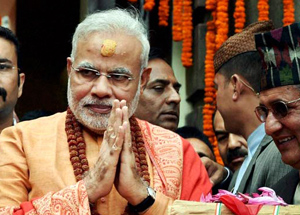New Delhi, August 5: The Opposition on Tuesday targeted Prime Minister Narendra Modi for not being sufficiently effusive in extending greetings to the nation on the festival of Eid, even as he has visited temples across the country, more recently the Pashupatinath Temple in Nepal on Monday.
While TMC raised the issue of the PM not extending greetings on EId, the Congress was upset over the discontinuation of Iftar parties by the PM.
Berhampore MP Adhir Ranjan Chowdhury said after Independence, most Prime Ministers and even Atal Behari Vajpayee had followed the tradition during Ramzan, and wanted to know why that practice was discontinued.
This comment drew criticism from the BJP and Speaker, Sumita Mahajan said personal matters cannot be raised in the House.
Speaking during Zero Hour, TMC’s Sudip Bandyopadhyay who began with a reference to communal tensions in the country and asked the government to remain alert and cautious, alluded to Mr. Modi’s temple visit in Nepal and said that while he appreciates his religious sentiments, he should communicate greetings to the followers of other religions as well.
“A new government has come into power; Government of India, I think, should remain alert, cautious and vigilant to prevent communal tensions; otherwise safety and security of the common people of the country and the secular fabric of this vast country will be under threat. The Government should rise to the occasion and assure the House,” he said.
He said the Prime Minister visited Pashupatinath temple and offered puja with 2400 kg ghee,“…We appreciate it, but the PM should have greeted the nation on Eid also. It was equally expected that the Prime Minister should communicate Eid Mubarak to others also.… as these are the common sentiments, ethos and feelings of the country. All castes and creeds, all sections of the people should be greeted with happy Vijayadashmi at the time of Vijayadashmi and Eid Mubarak at the time of Eid. Why is there such a difference?” he said.
Mr. Bandyopadhyaya’s observations drew a sharp reaction from the Treasury benches and the BJP MPs objected to the comments. The Congress, however, wanted to raise the issue as well, but Speaker Sumitra Mahajan asked Adhir Ranjan to associate with the TMC.
At this, the Congress began protesting and trooped into the well of the House to raise slogan for not being allowed to speak despite having given notices. The House was then adjourned for 15 minutes.
Parliamentary Affairs Minister M. Venkaiah Naidu made a statement in the House denying that the government has not treated other religions on par. “This Government believes in ‘Sarva Dharma Sambhava’. The Prime Minister visited Pashupatinath Temple. He has also given his greetings to the whole Muslim community across the country. It has been widely published,” he said.





Comments
Add new comment